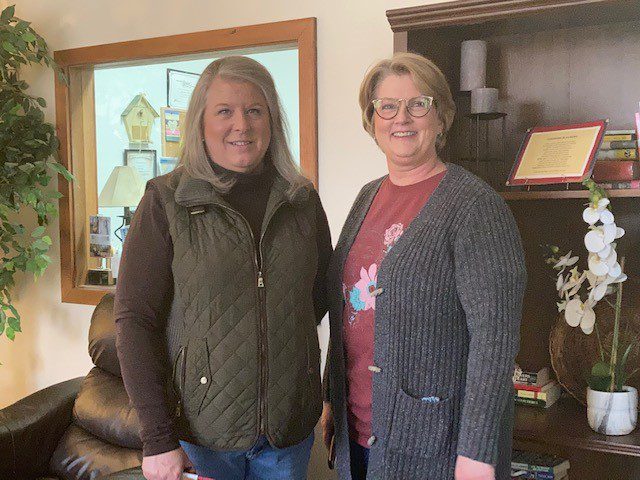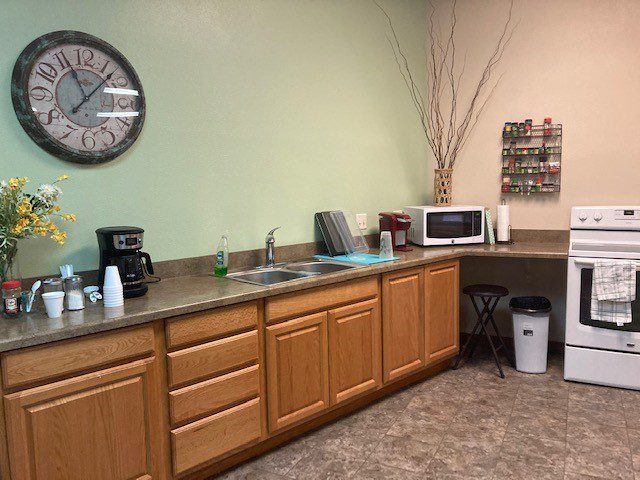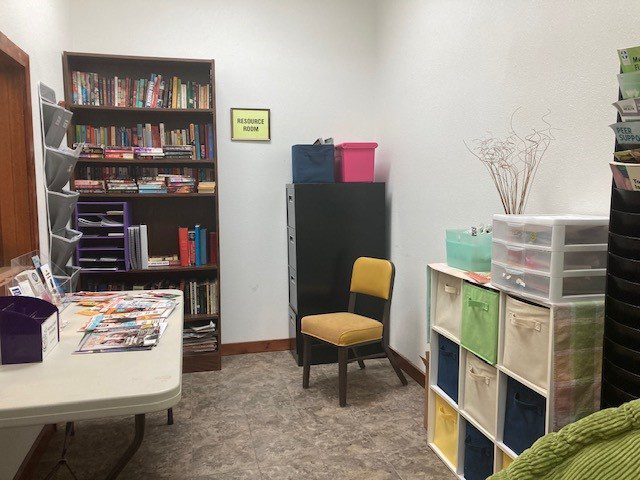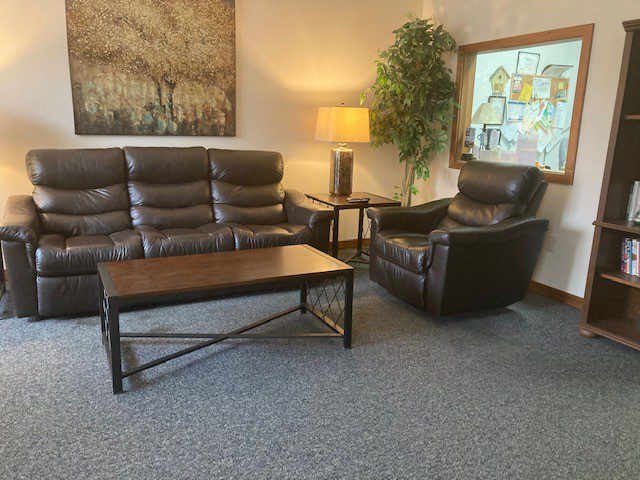

MINOT — The Harmony Center in Minot, a mental health recovery center, has been around for 34 years in the same facility but will be moving to a new location in the next few months.
Jennifer Bartsch, the director of the Harmony Center, explained what the center does, “[Our state code] is the Long-Term Psychosocial Rehabilitation Center. We very often get confused with substance abuse recovery, but we’re mainly focused on mental health recovery. When we say mental health recovery, we don’t mean the person’s going to get over their mental or behavioral health issue, we’re just trying to help them live the fullest life possible.”
“Basically, we’re helping them live a life,” said Tamra Huesers, recovery coordinator.
Huesers also explained what she does, “My main job is that I do the peer support and peer support groups, but I also help organize recovery education and whatever else needs to be done around here.”
In the peer support groups, they talk about anything from traumatic experiences, to meds, to tire changes.
“Also part of what Tamra does is we have guest speakers come and talk about different topics. We have groups on grief, we have Cooking 101 today, it is a myriad of really deep and tense to playful,” said Bartsch.
“We really attempt to be member directed as well,” said Huesers. “If members come to us and say, ‘I’m really interested in talking to someone about [something], we try to get that person in and have a class on that.”
Bartsch explained that the funding comes from the state general fund.
“When you hear about your tax dollars at work, this is literally a place that your tax dollar funds. We literally would not be here if people didn’t pay their taxes,” said Bartsch.
“We currently run on a budget of about $137,000 a year, and that’s for everything,” Bartsch continued. “That’s for Tamra and I, because there’s only two staff. That’s not very much. So when the state legislature meets every two years, all the human service centers go and present their budgets, and they are either approved or not.”
Bartsch said that the Trinity Hospital has picked up the contract to help run the center.
“So Tamra and I are actually Trinity employees,” Bartsch explained. “So, we have to adhere to all of Trinity’s guidelines, rules, trainings, mandatory online stuff, and then we also have to adhere to the state and Northcentral Human Center’s guidelines. So, we have a lot of oversight.”
Huesers described the experience they each have, “Jennifer’s been here since day one, and so she has 34 years of experience. I have a master’s degree in mental health recovery and social inclusion. I actually trained as an RN as well, so I have a medical background.”
“Individuals that come here need to be 18 or older,” said Bartsch. “They need to self-identify as having a behavioral health issue, that has changed over the years. Before it was a mental illness. The state likes to call it ‘behavioral health.’ You [can] literally walk through the door and say, ‘I suffer from depression,’ or ‘I have schizophrenia.’ It is not for me to question you, that is the beauty of recovery centers. We are not clinical in nature, so I don’t need to see any documentation. I’m not looking at a person with schizophrenia and saying, ‘Oh, a schizophrenic,’ I see Joe walking in and say, ‘Oh, what do you need, Joe?’”
Bartsch continued, “Back in the day, everything was kind of medical based. So back in the day, a person [let’s say] Susie would come in, and she was told [you take a daisy], schizophrenia was the middle part of the daisy, and one pedal would be Susie, and she’s a mom, and she likes to do art. So cut to now, person-based, non-clinical based. In the middle is Susie, and one pedal of her is ‘I have schizophrenia.’ It's just one tiny aspect, it does not define who she is. That’s how we approach things here.”
“And let’s say she decides to be a part of one of the peer support groups, and she might come in, and she might want to talk about ‘I have schizophrenia,’ or she might say, ‘I’m hearing voices, and this is really bothering me, and it’s keeping me from going to work,’” said Huesers. “And somebody else might say, ‘I’ve had that issue in the past, I don’t hear them as much, and here’s what helped me.’ So that’s the beauty of that, she can identify as much or as little of that diagnosis or her struggle as she wants to in those peer support groups. Or she might just come and say, ‘I have trouble being out in public, what do you guys do?’ And we don’t know what her diagnosis is, and she doesn’t need to tell us.”
“Most people are going to go through a bout of depression, because we’re all going to lose a loved one or a pet, sometimes it’s a good thing like you get a promotion, and you’re moving to Texas, and it’s bittersweet” said Bartsch. “It’s whether you come out of that.”
The space the center is moving to will be much smaller, says Bartsch. “Right now, there’s a lot of ‘dead space.’ It will be a lot more intimate. There is probably going to be a lot more forced interaction. It’s bittersweet, but we take our members with us. We’re waiting to officially have the lease signed, but we have to be out by the end of June, because that’s when the lease [here] ends.”
Items such as the center’s pool table will not be able to be moved into the new facility, but the whole kitchen with its cabinets and counter will.

The center also has a washer, dryer, treadmill, and computer that will come with.
The center is open from 9:00 a.m. to 7:00 p.m. on Monday and 9:00 a.m to 5:00 p.m. from Tuesday to Friday, with activities every day, and peer support 5 times a week.
“It is up to them what they want to participate in,” said Bartsch.
“We still do some remote, or hybrid is what we call them, so people can join online or in person,” said Huesers. The center also does one on one peer support, which includes planning. “We try to make it very person based. Friday is more recreational, kind of social type peer support.”
There are 8 recovery centers across the state that all follow state guidelines.
“Because we’re member driven, each region then gets to determine what are the activities that you wanna do,” said Bartsch. “You have to have at least one peer support a week. Ours like a lot of peer support. Bismarck likes more recreational.”

The Harmony Center also has a mini library and a lounge area.

Huesers said that even the name was voted on by the members, which as of now is 96 members. She also mentioned that there has always been around 100 members a year, with many that come and go. The average age is around 35, with some members that are 18 and some that are 80.
As far as donations go, Bartsch talked about their Give and Take Corner, “Donations come from all over, and so we put it back there,” said Bartsch. “Members come, go through it, and take whatever they would take. Then we go through it, and it eventually moves on to a thrift store, so we can new stuff in. Our new space will be much smaller, more like a closet. I can’t say [you can give] ‘Oh everything,’ because then people might give us everything, and we don’t have enough space.”
“The things that people take are some clothing items, especially sweatshirts and coats, things like that,” said Huesers. “And household items.” Items such as milk and eggs would probably go to waste.
“We’ve had members that will stay away for years for whatever reason,” said Bartsch. “And they will come back knowing that they are always welcome.”
More information on the Harmony Center can be found on its Facebook page.